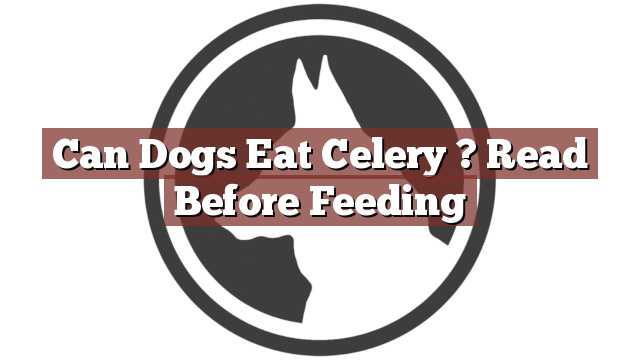Understanding Your Dog’s Dietary Needs
As a responsible pet owner, it is crucial to understand your dog’s dietary needs. Dogs have specific nutritional requirements that differ from humans. While some human foods are safe for dogs to consume, others can be harmful or even toxic. Therefore, it is essential to research and educate yourself about the foods you can or cannot offer to your furry friend. This article will focus on one such food item: celery.
Can Dogs Eat Celery? Read Before Feeding
Can dogs eat celery? This is a common question that many dog owners have. The answer is yes, dogs can eat celery in moderation. Celery is a low-calorie vegetable that is packed with essential vitamins and minerals. It is a great source of fiber, which can help with digestion and maintain bowel regularity in dogs.
However, it is important to note that not all dogs may have the same reaction to celery. Some dogs may have sensitivities or allergies to certain vegetables, including celery. Therefore, it is crucial to introduce any new food gradually and in small quantities. Additionally, always consult with your veterinarian before making any significant changes to your dog’s diet.
Pros and Cons of Feeding Celery to Dogs
Feeding celery to your furry companion can have several benefits. Firstly, celery is a healthy and nutritious snack that is low in fat and cholesterol. This makes it an excellent option for dogs who are overweight or on a weight management diet. The high fiber content in celery can also aid in maintaining healthy digestion and preventing constipation in dogs.
On the other hand, some potential downsides to feeding celery to dogs include the risk of choking. Celery stalks can be quite fibrous and stringy, which may cause a dog to choke if not properly chewed. Therefore, it is crucial to ensure that the celery is cut into small, manageable pieces before offering it to your dog. Additionally, while celery is generally safe for dogs, some may experience digestive issues such as gas or diarrhea if they consume it in excessive amounts.
Conclusion: Considerations for Feeding Celery to Your Dog
In conclusion, yes, dogs can eat celery, but it should be given in moderation and with caution. As with any new food, it is important to introduce celery gradually and monitor your dog’s reaction. Always consult with your veterinarian before making any major changes to your dog’s diet, especially if your dog has any pre-existing health conditions.
Remember that every dog is different, and what works for one may not work for another. Some dogs may enjoy the crunchy texture and taste of celery, while others may not show any interest at all. Ultimately, it is up to you as the pet owner to make informed decisions about your dog’s diet and ensure their overall well-being.
Thank you for taking the time to read through our exploration of [page_title]. As every dog lover knows, our furry friends have unique dietary needs and responses, often varying from one canine to another. This is why it's paramount to approach any changes in their diet with caution and knowledge.
Before introducing any new treats or making alterations to your dog's diet based on our insights, it's crucial to consult with a veterinarian about [page_title]. Their expertise ensures that the choices you make are well-suited to your particular pet's health and well-being.
Even seemingly harmless foods can sometimes lead to allergic reactions or digestive issues, which is why monitoring your dog after introducing any new food item is essential.
The content provided here on [page_title] is crafted with care, thorough research, and a genuine love for dogs. Nevertheless, it serves as a general guideline and should not be considered a substitute for professional veterinary advice.
Always prioritize the expert insights of your veterinarian, and remember that the health and happiness of your furry companion come first.
May your journey with your pet continue to be filled with joy, love, and safe culinary adventures. Happy reading, and even happier snacking for your canine friend!

